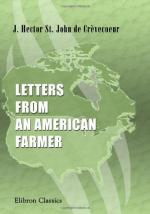“This,” said he, “is altogether the fruit of my own contrivance; I purchased some years ago the privilege of a small spring, about a mile and a half from hence, which at a considerable expense I have brought to this reservoir; therein I throw old lime, ashes, horse-dung, etc., and twice a week I let it run, thus impregnated; I regularly spread on this ground in the fall, old hay, straw, and whatever damaged fodder I have about my barn. By these simple means I mow, one year with another, fifty-three hundreds of excellent hay per acre, from a soil, which scarcely produced five-fingers [a small plant resembling strawberries] some years before.” This is, Sir, a miracle in husbandry; happy the country which is cultivated by a society of men, whose application and taste lead them to prosecute and accomplish useful works. “I am not the only person who do these things,” he said, “wherever water can be had it is always turned to that important use; wherever a farmer can water his meadows, the greatest crops of the best hay and excellent after-grass, are the sure rewards of his labours. With the banks of my meadow ditches, I have greatly enriched my upland fields, those which I intend to rest for a few years, I constantly sow with red clover, which is the greatest meliorator of our lands. For three years after, they yield abundant pasture; when I want to break up my clover fields, I give them a good coat of mud, which hath been exposed to the severities of three or four of our winters. This is the reason that I commonly reap from twenty-eight to thirty-six bushels of wheat an acre; my flax, oats, and Indian corn, I raise in the same proportion. Wouldst thee inform me whether the inhabitants of thy country follow the same methods of husbandry?” No, Sir; in the neighbourhood of our towns, there are indeed some intelligent farmers, who prosecute their rural schemes with attention; but we should be too numerous, too happy, too powerful a people, if it were possible for the whole Russian Empire to be cultivated like the province of Pennsylvania. Our lands are so unequally divided, and so few of our farmers are possessors of the soil they till, that they cannot execute plans of husbandry with the same vigour as you do, who hold yours, as it were from the Master of nature, unencumbered and free. Oh, America! exclaimed I, thou knowest not as yet the whole extent of thy happiness: the foundation of thy civil polity must lead thee in a few years to a degree of population and power which Europe little thinks of! “Long before this happen,” answered the good man, “we shall rest beneath the turf; it is vain for mortals to be presumptuous in their conjectures: our country, is, no doubt, the cradle of an extensive future population; the old world is growing weary of its inhabitants, they must come here to flee from the tyranny of the great. But doth not thee imagine, that the great will, in the course of years, come over here also; for it is the misfortune of all societies everywhere




